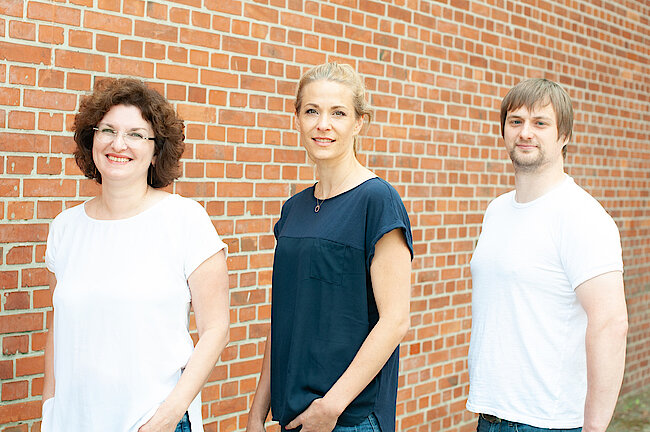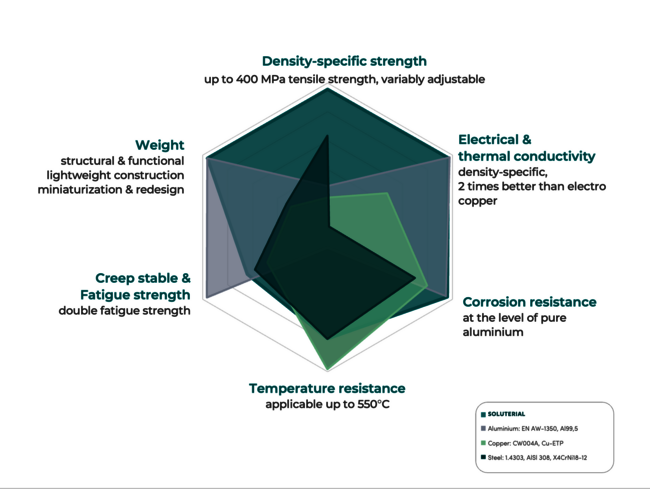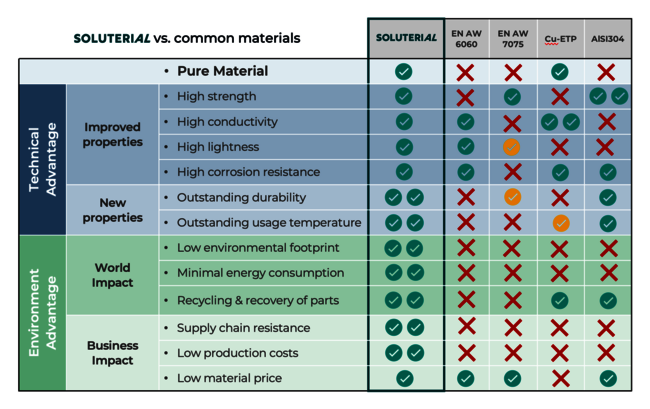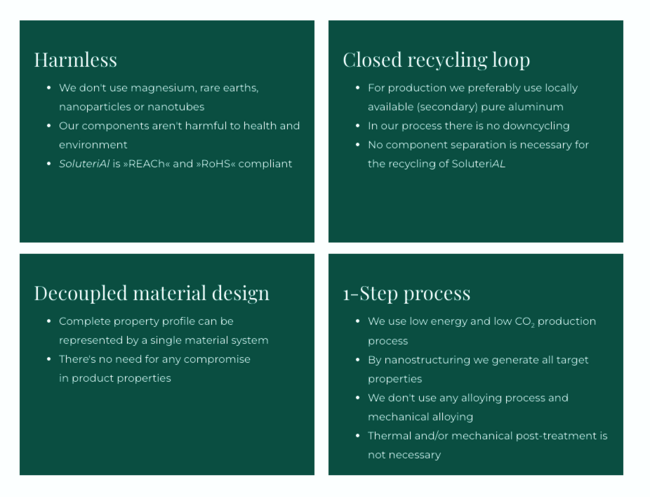
[Translate to English:] The team: Dr. Alla Kasakewitsch, Christina Walch, Uwe Arlic
Soluterials GmbH
-
Sector: Production of powder metallurgical products
-
Established: 2020
-
Employees: 3
From science to entrepreneurship: Ms. Kasakewitsch, what is your vision and motivation that led to the founding of Soluterials?
My vision for starting my own business was and is to make the world a better and safer place with the help of the invention that makes it so. To bring a sustainable material to the market that opens up a new world of metallic materials. The motivation was and is to verify the application potential of the research results in practice.
You co-invented the high-performance aluminium material "SoluteriAL". What is the special feature of this material?
The special feature of the SoluteriAL material is its combination of diversity. It is the combination of technical properties, economy and environmental friendliness. On the technical level, SoluteriAL combines high strength with up to 450 MPa with very high conductivity, corrosion resistance and high-temperature use up to 500°C. And for the experts: it is the first creep-resistant aluminium! The economic efficiency is not only shown in the market price and the enormous savings in production - not only for us but also for the customer application. It starts with our production, a 1-stage manufacturing process, and becomes accepted by the customers, e.g. by incredibly good machinability and the simultaneous omission of any heat treatment, to adjust and maintain properties. This brings enormous savings.
Environmental friendliness and sustainability take on completely new meanings with SoluteriAL. SoluteriAL is and remains pure aluminium, without any alloying elements or additives. This means that dependence on resources is eliminated or reduced to an absolute minimum. There are no magnesium, silicon or rare earth metals in "SoluteriAL". It is the pure aluminium, there is nothing but aluminium in it. The production is purely mechanical, without melting, without gases. We only need electricity, preferably from a sustainable source.
What steps did it take to go from science to industry?
The origin of the idea to decouple material properties is in my PhD. But to generate a marketable product out of it is not, this was not possible for me at that time. For me, a commercial product means being able to produce a material in a market-relevant quantity and at a market-acceptable price, and also being able to sell it. Ultimately, a product is marketable when the market needs it.
Between science and my own company, I made a stopover in industry. It was a valuable time when I was able to gain a lot of experience and build/expand a professional network. During this valuable time, I realised that my scientific interests are in line with the interests of the company/industry. By participating in various technical events, I have always followed discussions, each with the same theme: that materials "of today" cannot do enough. When selecting a material, compromises always have to be made. The focus is usually (forcibly) placed on one property and the loss of other properties is automatically accepted - because it is not possible any other way. At that time, my stomach started to tingle, because I already had the solution in my drawer, it just had to be realized and scaled for industrial use.
I shared these thoughts with my former student, and now colleague, Uwe Arlic. Uwe not only grasped my idea immediately, but he transformed it further. It was his idea how the original material could be produced on an industrial level and thus become a marketable product. From this, our business idea was born. As part of qualifying our business idea, we began a lively exchange with the industry, especially within our professional network. We learned how many challenges would be eliminated if our material came into real use. Initially, we received concrete confirmation from the laboratory analysis, telecommunications and aerospace industries, but we quickly collected corresponding statements from across industries. And so we began our business journey.
This was the time when our current colleague Christina Walch joined the team as a business part and since then she complements us with her competencies. Christina started to prepare the market entry by working out the business concept. For example, the combination of the words "Solution for Materials" gave rise to our current company name "Soluterials". Consequently, we gave our aluminium material its name "SoluteriAL" - it is indeed a real problem solver that enables "out-of-the-box thinking".
After conducting our needs analysis and prioritization, we quickly realized that we needed financial support. Here, we initially focused on European funding aimed at startups in the "DeepTech" or "Advanced Materials" field. And this paid off. In May 2022, we won the "EIC WomenTechEU" award, which came with a grant. This helped us sharpen the business idea and expand our patent protection and prepare for licensing. In addition, the period of transition from 2014 to 2020 European funding period to 2021 to 2027 and the associated new direction of national funding combined with the Corona pandemic created a vacuum. In some cases, it was simply not possible to apply for funding, or the decisions took an unusually long time (for example, we waited a whole seven months for a decision instead of the two months we had been advised, and the payment was then delayed for a further six months - which was particularly annoying for a young company receiving funding in arrears).
At the same time, we had to realize that a young company is also very limited in applying for funding because many grants are paid in arrears, i.e. the invoices are issued and a call is only possible after the fact. Especially for start-ups that are at the beginning of their business and have limited financial resources, this is a very high obstacle. And this is just one example of various obstacles - not to mention the bureaucracy and the associated workload for the application and later settlement, which is added to the daily business set-up. We would like young start-ups to have real access to funding, which also takes into account the initially limited financial resources in particular.
What personal competencies (in the sense of mindset) are needed to successfully take an idea from science to the industrial application? Can anyone become an entrepreneur?
In my eyes, a mix of different competencies plays an important role. There are so many companies and every company has had at least one founder, who usually quickly brought reliable competencies into his team to put his company on a solid footing. In this sense, our team is characterized by living differences - it is allowed to "crash" from time to time. The important thing is that everyone always remains respectful and constructive, and we manage to do that every time.
In any case, the following competencies are very helpful for my understanding:
- the ability to build a team - recognize competencies and trust in people,
- openness to discussion and other opinions/views,
- the ability to listen to the people around you and listen to them,
- making decisions,
- to set priorities and
- see and focus on both short-term and long-term goals.
You are the CEO of Soluterials. In your day-to-day business with corporate clients - is it easier or harder to compete as a woman in the industry?
I'm used to looking at facts as resources. I am a woman - that is my resource, with all its drawbacks but also many advantages.
What advice and/or decision-making tool would you like to share with interested people, and women in particular, who are toying with the idea of starting a start-up?
Before you start doubting, try it out.
Form a team and take action!
Start doing it, making your idea a reality - that's the only way to find out if it's right for you.
Presentation video Soluterials
Thank you very much Ms. Kasakewitsch for the exciting and detailed interview. We wish you and your team all the best for the future.
![[Translate to English:]](/fileadmin/_processed_/f/0/csm_logodgm-4_b2722eeace.png)
![[Translate to English:]](/fileadmin/user_upload/logodgm-4.png)


